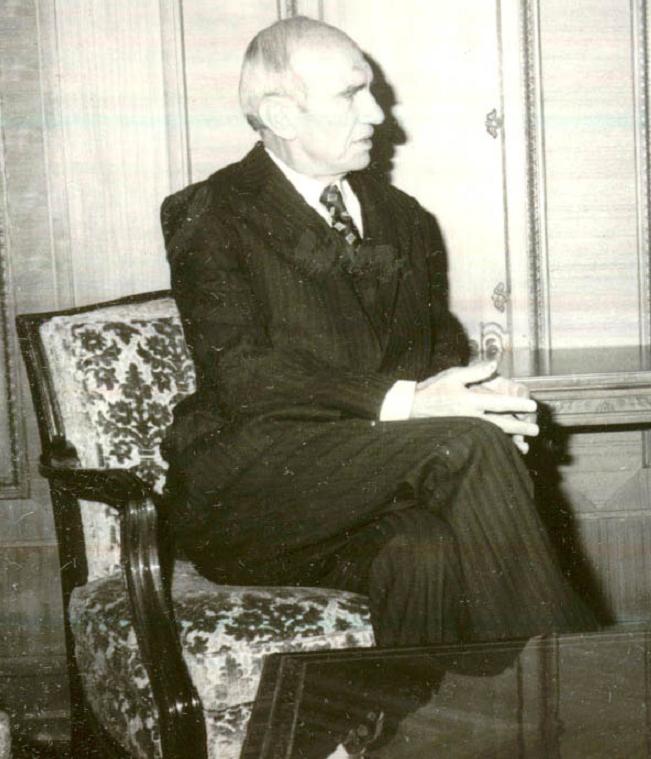- Rudolf Kirchschläger
Infobox President | name=Rudolf Kirchschläger
nationality=Austrian
order=8thPresident of Austria
term_start=July 8 ,1974
term_end=July 8 ,1986
vicepresident=
predecessor=Franz Jonas
successor=Kurt Waldheim
birth_date=March 20 ,1915
birth_place=Niederkappel ,Upper Austria
death_date=death date and age|2000|3|30|1915|3|20|mf=y
death_place=Vienna
party=non-party
spouse=Herma Kirchschläger
religion=Roman Catholic Rudolf Kirchschläger (
March 20 ,1915 –March 30 ,2000 ) was anAustria ndiplomat ,politician ,judge and, from 1974 to 1986,Austrian president .Education and early life
Born in
Niederkappel ,Upper Austria , Kirschläger was orphaned at the age of 11. He graduated from High School in Horn in 1935 with distinction and started to studylaw at theUniversity of Vienna . However, after theAnschluss of Austria in 1938, he had to give up his studies. Without joining theNSDAP , which he refused to do, his scholarship was revoked and Kirchschläger could not finance his studies any more. Kirchschläger worked as a bank clerk in 1938 until he was drafted to service in the infantry of theWehrmacht in the summer of 1939. Kirchschläger fought as a soldier from the very beginning of the war, first during the invasion ofPoland , later on theWestern Front and after 1941 against Russia on the Eastern Front.In late 1940, in order to get out of the military, he used a two-month front-leave to prepare for the final exam (Staatsexamen) of his law studies. Legend has it that he was working up to 20 hours a day, while keeping himself awake with large amounts of honey. Subsequently he passed the exams and graduated to Dr. iuris. Nevertheless he was sent back to the Eastern Front, where he was wounded in 1942. Towards the end of war, he was captain and training-officer at the military academy at
Wiener Neustadt in the Vienna region. In early April 1945, commanding a company of cadets fighting approaching Soviet troops, he was badly wounded on his leg, an injury from which he would never fully recover.Post WW2 life
After the war Kirchschläger worked as a
district judge until 1954 inLangenlois and laterVienna . In 1954 he got the chance to work in the Ministry of Foreign Affairs, although he did not speak any foreign languages. In order to take part in the negotiations on theAustrian State Treaty he taught himself English in only a few months.From 1967 to 1970 he was ambassador in
Prague . His behaviour during the Soviet invasion of Czechoslovakia in the spring of 1968 is most notable. Despite orders not to do so he issued exit visas to Czech citizens who tried to flee from the Communists.From 1970 to 1974 he was Minister of Foreign Affairs and was elected
President of Austria in 1974. He was a statesman with a philosophical mind and a great admirer ofKarl Jaspers . In a programmatic lecture atInnsbruck University in February 1971 he outlined his understanding of an "ethical foreign policy". His integrity as President and his diligence in exercising his office raised him to be an admired and beloved figure within Austrian politics. In 1980 he was elected for a second term with an approval rate of 80%, the highest rate ever obtained in any presidential elections.Kirchschläger died in 2000 near Vienna.
Literature
* Rudolf Kirchschläger, "Der Friede beginnt im eigenen Haus. Gedanken über Österreich". Vienna: Molden, 1980. ISBN 3217010701
* Rudolf Kirchschläger, " Ethik und Außenpolitik," in:Hans Köchler (ed.), "Philosophie und Politik. Dokumentation eines interdisziplinären Seminars". Innsbruck: Arbeitsgemeinschaft für Wissenschaft und Politik, 1973, pp. 69-74.-
Wikimedia Foundation. 2010.
